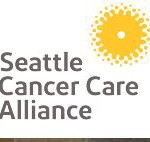 My latest project is working with a national cancer center, and I feel fortunate to be a small part of the work they do, helping healthcare providers more efficiently support patients through their cancer treatment.
My latest project is working with a national cancer center, and I feel fortunate to be a small part of the work they do, helping healthcare providers more efficiently support patients through their cancer treatment.
Driving to work one day my husband commented, “Look, you can see the Seattle Cancer Care Alliance sign from way down here.” It was true: despite all the construction in the South Lake Union area, the building sign stood out like a beacon. “I wish they didn’t have to be here,” I said. “I wish they’d find a cure.”
The American Cancer Society (ACS) projected that about 1.7 million new cases of cancer would be diagnosed in the year 2014, and estimated that over half a million Americans would die of the disease in the same year—nearly 1600 people every day. A cure for cancer has eluded scientists for decades, and over those years countless lives have been lost in the struggle. Along with these lives are lost dreams, hopes and contributions to the world in which we live. Parents’ arms are left empty when their child succumbs to leukemia. A woman’s body is ravaged when triple negative breast cancer claims both breasts and eventually her life. A pancreatic tumor cuts a man down just as he enters his prime and most productive and happy years.
Although survival rates are improving for some cancers and more and more survivors are living among us, the trickster, cancer, continues to elude us with its causes and mutations, its variations and resistance. In the meantime, the disease’s devastating wake can wreak havoc on families and relationships, finances, employment, community activities, and almost every aspect of a person’s life.
Partnerships such as that found at the Seattle Cancer Care Alliance bring together resources for scientific inquiry, technology, and the passion to care for patients and their loved ones. This synergy, along with the generous support of the community, gives us hope that one day, cancer will be discussed as a disease of days gone by.
Working as a contributor on a grant to help those so dedicated to working in cancer care is a privilege I won’t forget. It also provides a ray of comfort, however small, to the empty space that cancer left in my own heart.
Speak Your Mind